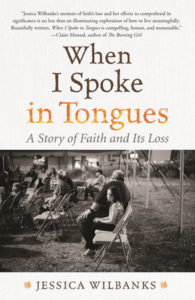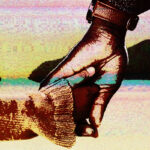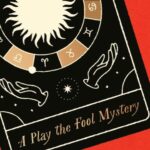What It’s Like to Be Rejected by Your Religious Family
Jessica Wilbanks On the Pain of "Falling from the Nest"
When my friend’s mother pulled into my parents’ driveway, the sun already lay low on the tree line, infusing the cornfields that surrounded the house with a thick, yellow light. It was the September of my senior year, and I flounced into the house in my too-short plaid uniform skirt and knee socks and threw my bookbag on the dining room table. My mother fussed with the ever-expanding pile of dishes by the sink, and my father sat reading a newspaper at the blond wood table in the middle of the room, wearing a polo shirt stamped with the name “The King’s Masons,” an all-Christian masonry crew he had worked with years before. It was strange that he was home so early on a day when it wasn’t raining. He cut his eyes at me over his bifocals and I made a face at him and snagged an apple from the bowl of fruit on the table. But when I tried to tell my parents about what my physics teacher had done that day, my father kept his eyes on the paper and my mother didn’t turn around, just kept fiddling with the dishes. I trailed off and they didn’t seem to notice.
“Hello?” I said, not looking up at first, still focused on peeling the skin off the apple. When I looked up, my father was standing in front of me with his mouth open, clearing his throat and shifting around. My mother was drying her hands on a dishtowel.
“Your father and I want to talk to you.” Her voice was strange and raspy, and I started to sit down at the table.
“Not here. Outside.”
“Mom, what’s going on?”
“Leave the apple,” she said.
As I followed them out to the yard, my first thought was that someone had died. But I could hear my brothers wrestling in the living room, five-year-old Joshua acting as a referee. It must have been my dad’s mother, I thought.
When I tried to tell my parents about what my physics teacher had done that day, my father kept his eyes on the paper and my mother didn’t turn around, just kept fiddling with the dishes. I trailed off and they didn’t seem to notice.We walked out into the chilly September evening. Our new rented farmhouse was white with red shutters, a brick red chimney, and a long, wide front porch. 60 yards out in the middle of that green ocean of a yard were three lawn chairs, the cheap kind with rusted metal legs and plastic canvas plaits. One for my mother, one for my father, and one for me. When I saw those chairs, I decided that the years of my father’s temper and my mother’s sadness had caught up with them and they had finally decided to get a divorce. I prepared myself, wondering where my dad would live and who would cook dinner for him.
My mother still held a blue-and-white checkered dishtowel in her lap. She started speaking, her voice quivering. She usually stuttered when she was nervous, but the words came out clean and plain.
She said, “We know that you are a homosexual. Your father read your journal.”
The soft noise of the crickets and cicadas in the background turned into an overpowering buzz that drowned out my mother’s voice and whatever my father said after that. Some duller, more primitive part of my mind unpacked their words and pieced the story together. Their discovery had come several weeks before. I’d spent a Friday night at a friend’s house, staying up until dawn watching Escape from the Blue Lagoon and music videos, raiding her parents’ refrigerator for chips and drinking Mountain Dew. Back at the farmhouse my father was up late too, reading one of his Westerns in my bed. That wasn’t unusual—for as long as I can remember he slept on the couch, passing out in the early evening with a couch pillow behind his head and no blanket, his belly rising and falling, snorting and shaking with his breath. When an empty bed was available, he took advantage of it.
My father’s story was that he had dropped his book behind my bed. When he reached for it he picked up the lime-green spiral notebook that I had squirreled away by the headboard, and in which I wrote about the days remaining until I left for college and all the things I wanted. He opened it and followed the purple curlicues of my adolescent handwriting and learned what I’d been up to. I hadn’t held anything back, not to that notebook. I had written about going out deep into the cornfield and bringing along a smashed pack of cigarettes and a pack of gas station matches nabbed from the junk drawer. I had written about that night at the beach a few years before, when I felt a tug of desire for the girl with kohl-rimmed eyes and tangled hair. I had written about smoking pot from a smelly old foil pipe with friends at the beach near my aunt’s house.
But worst of all I had written about kissing my friend Sophie in my parents’ living room during a sleepover a month before. Sophie didn’t fit in with the rest of the crowd at Calverton. She listened to Janis Joplin and Bob Dylan and still hung out with her old friends from Calvert High on the weekends. She couldn’t have been more different than my white-bread friends who loved boy bands and pop music. Sophie seemed to be in tune with something bigger, something I thought I was moving toward.
He opened it and followed the purple curlicues of my adolescent handwriting and learned what I’d been up to. I hadn’t held anything back, not to that notebook.My notebook told the story about how, one night, when Sophie was sleeping over on the futon on the living room floor, she played that girl’s game of having a secret she wouldn’t tell, and for hours I cajoled her and tried to talk her into confessing. She wouldn’t say anything. Finally, she admitted that she had a crush on someone, that she stayed up late thinking of what it would be like to kiss this person. I finally realized that she was talking about me, but I didn’t let on that I knew. We kept chatting and teasing and meanwhile my heart was racing. She took my face in her hands and kissed me softly, and suddenly I was all body and no mind at all. As I felt her lips against mine, my brain started up with all the reasons this was wrong and unnatural. But it was dark and quiet and her skin was so soft that part of me felt like it would smear if I touched it. Her mouth tasted faintly of raspberries, and after a few moments my mind turned off. In the morning, when I woke up to her brown hair splayed out on the pillow beside me I felt no guilt at all, only an incredible sense of lightness. I felt older and wiser, more confident. A woman. As we ate scrambled eggs and pancakes to the sound of my brothers’ shrieks, I gazed at her across the table and we smiled secret smiles at each other.
*
There is a particular kind of feeling that tattoos itself into your bones, where it aches for days and weeks afterward, and keeps aching whenever you think of it years later. Out there on that summer night on the lawn, as the sky went blue-black and the seagulls made their way over the corn and toward their nests, I felt myself slipping away. My parents built a tower of words, I don’t know you anymore and evil and sin and unnatural. But I wasn’t listening. I knew that story. I’d heard it a thousand times, from Pastor Jim’s lips, from Miss Kathy, from my mother’s books about how a Christian ought to live. I knew about that great force of evil in the world that warped men and women’s natural passions for one another and turned them inside out. It was the story of an abomination, an evil as powerful and insidious as a poisonous gas. I had heard that story in my head the moment I drew back from kissing Sophie, and again when I washed my face and hands in the bathroom. But there was another voice in there too, a voice that said what we did was gentle and innocent and nothing to feel shame over.
My mother was shocked and sad. She couldn’t put it together, she just didn’t understand. But my father inspected his nails and then looked at me coolly. He had tasted more of what the world had to offer than my mother had. He wasn’t surprised that I had said yes to cigarettes and alcohol, warm arms and lips, female or male. But they both rejected the idea that I was intrinsically bad. Instead they had decided that evil had gotten into me and jumped under my skin. This unnatural sexual urge that I had was a virus, a pollutant. It went without saying that I would never be allowed to spend time with Sophie again.
My parents built a tower of words, I don’t know you anymore and evil and sin and unnatural. But I wasn’t listening. I knew that story.Sitting there, hearing my parents’ words wash over me, I felt the dull burn of a brand across my chest. Homosexual. There had been a nest and I had fallen out of it. I already knew there was no going back inside. As night stretched over the lawn my parents studied me as if I was an intractable algebra problem. They couldn’t solve for X; they couldn’t figure out what had gone so wrong. It would have been different if I had reached for a boy, or even a man. Those desires were a well-trodden path, mistakes thousands of girls before me had made. But I hadn’t picked the apple. I had reached for the snake itself.
*
That summer I tagged along with my father when he drove into northern Virginia on Saturdays. I rode the Metro into Washington, DC, and got off at random stops to walk around. With a Metro card in my pocket I felt free, the same clear, exhilarating feeling I used to have when I got up before dawn with my father to walk Calvert Beach with the twins. The day stretched out like a horizon in front of me and all that time was mine. There were no brothers around to distract me, no mother to read over my shoulder, no father to come home with darting eyes and make everyone tremble. I spent hours in the Smithsonian museums, gaping at abstract paintings and re-constructed dinosaur bones. I bought egg rolls in Chinatown and walked all the way up to Dupont Circle to eat gummy bears on a bench in front of a marble fountain with a statue of a naked woman. I talked to everyone: store clerks, security guards, the homeless people who set up their tents on the sidewalks of the city. Wherever I went, I kept my eyes open for the city of sin Pastor Jim talked about, but I couldn’t find it.
One day I steeled myself and walked into the gay and lesbian bookstore on Connecticut Avenue. Two rainbow flags framed the doorway. The man behind the register had a shock of grey hair and wore thick black-rimmed glasses. He looked like one of the deacons at church and didn’t pay me any attention. I wandered through the aisles and trained my eyes on the sides of the books. I was afraid to pick them up, but the titles alone were an education. A woman appeared, friendly, with a masculine edge to her. Her face was kind, but hard at the same time, so different from the women at church, with their old-fashioned hairstyles.
“Is there anything I can help you with?”
I peered up at her and was immediately tongue-tied. I wanted to ask her if she grew up like me, listening to sermon after sermon about how she herself was an abomination, and what it had taken to get those words out of her head. If sometimes she got so nervous she bit down on the skin on the inside of her cheeks or the skin on the top of her knuckles. If she and I and that bespectacled man behind the counter and all those young men in tight jeans hanging out over by the fountain were all going to hell. I wanted to ask her what it was about us that scared people so badly. Where it was that I could hide my notebooks to keep my parents from finding them. If I should even bother coming home for Christmas when I got to college. Why my heart leapt for Sophie at the same time it sometimes leapt for boys. If there was some sign that women can wear to show they’re interested in each other. A pinky ring, a green scarf?
The chime on the door clanged and her eyes darted over to see who had just walked in. When she met my eyes again, I told her I was just browsing. On the way out, I picked up a copy of the Washington Blade, and on the subway I splayed it open on my legs so nobody could see what I was reading. I read articles about AIDS, about a group called PFLAG, a profile of some C-list actress, a review of Angels in America. As the train tunneled underneath the Potomac I read the singles ads, amazed by everything people wanted to do to each other. I was too nervous to bring the newspaper home, even tucked in my bag, so I threw it away in the garbage can at the King Street Metro station.
The cab of my father’s ancient pickup truck smelled like engine oil and lawn clippings, and I had to be careful not to catch my jean skirt on the wire poking out of the ripped bucket seat. When we crossed the Woodrow Wilson Bridge, I looked down and saw that the newsprint had stained the skin above my knee red and black. I licked my fingers and rubbed the words away.
__________________________________

From When I Spoke in Tongues: A Story of Faith and Its Loss. Courtesy of Beacon Press. Copyright 2018 by Jessica Wilbanks.




















